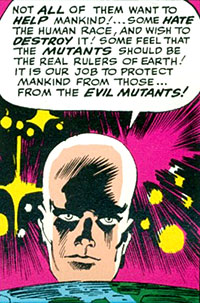 With the new X-Men movie, “Days of Future Past,” set to arrive in theaters May 23, here’s a timely read for pulp fans:
With the new X-Men movie, “Days of Future Past,” set to arrive in theaters May 23, here’s a timely read for pulp fans:
Dr. Hermes (aka Edward Felipe) over at Dr. Hermes’ More Retro Scans examines “The real source of the whole X-Men concept.”
Hermes sums it up in his opening paragraph: “Every comic book and movie featuring the X-Men should in all fairness have a credit on it somewhere, ‘Inspired by the 1945 “Baldy” stories of Henry Kuttner and Catherine L. Moore.’ ”
The stories originally appeared in Astounding; and Hermes provides a recap of each in the article (which was originally posted in the rec.arts.sf.written newsgroup back in 2004).
Just as the fiction in the pulps was influenced by the dime novels that preceded them, the larger-than-life heroes illustrated in the comic books were influenced by the pulp magazines.
SPEAKING OF LARGER-THAN-LIFE: Connor Gormley writes about “Living It Large: How Larger Than Life Characters Work” over on the Black Gate blog.
He examines why such stereotypical — and often unlikable and unrelatable — characters are so popular in Sword and Sorcery, such as Robert E. Howard‘s works, and other popular media.
“Well, I think it’s worth remembering that sometimes all we want is to see someone kick some serious butt, and not have to worry about stupid things like plot, character development, and world building,” he writes. “At this point, all the reader really needs is the slightest shred of context, and away you go. Larger-than-life characters, with their simplistic yet eccentric personalities, are a good way to achieve this without making your protagonist banal.”
His essay is written as if talking to writers, but it’s still informative for readers.
SCIENCE FICTION’S REPUTATION: Chris Beckett at The Atlantic‘s website discusses “The Underrated, Universal Appeal of Science Fiction.”
He writes: “The assumption is made that the stuff on the ‘general fiction’ shelves is the serious stuff — after all, it includes the literary greats — while the stuff cordoned off in those corners is, by definition, light, inconsequential, or even trashy. In fact, generalizations are made about the whole of ‘genre fiction’ as if it were all one thing.”
That same derision also is often applied to all fiction that appeared in the pulp magazines.
Of course, science fiction found its true form in the pulp magazines, beginning with Amazing Stories. (For more on that, check out Mike Chomko‘s history of SF that has been running on the PulpFest website.)

